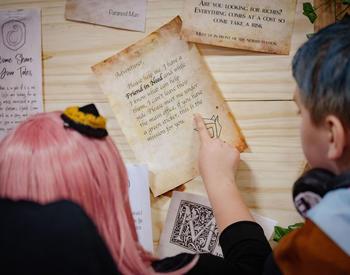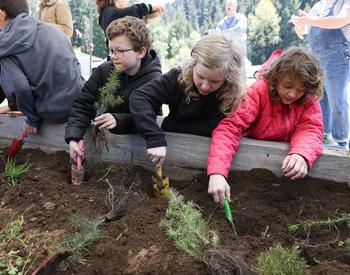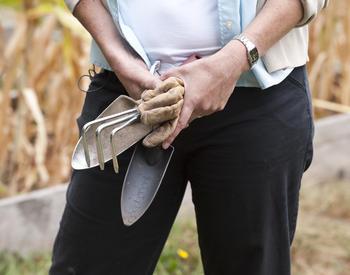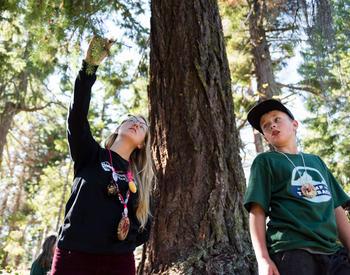CANBY, Ore. – Grant Parker held the lead rope as he guided Fonzie the llama through the obstacle course at the Clackamas County Fair.
Parker, a senior member of the Spring Creek Sproingers 4-H club, walked Fonzie through the course set up in the llama and alpaca show ring.
Fonzie went over the teeter totter and a bridge and weaved through poles sticking out of the ground. Because llamas are excellent pack animals, the obstacles are meant to simulate trail conditions.
There was a time when Fonzie would assume the “kush” position as he approached a simulated waterfall at the end of course. That is, he would simply sit down.
This time, Fonzie was cool. He strolled through the water.
“I was worried that he wouldn’t go through it,” Parker said. “It took a little coaxing.”
Although not as abundant as cattle, sheep, swine and goats, llamas are a livestock animal shown by 4-H youths at county fairs in Oregon and across the United States. 4-H Youth Development is a program of the Oregon State University Extension Service that serves more than 20,000 youths across the state.
One of them is Parker, a junior at Wilsonville High School. He’s been caring for and training with Fonzie for three of the five years he’s been in the Spring Creek Sproingers. He leases Fonzie from Joyce O’Halloran, the founding Spring Creek Sproingers club leader and owner of Joyful Llama Ranch in West Linn.
“A friend of mine got me interested in llamas,” said Parker, adding that he gets questions “on the daily” from his classmates who want to go with him to see Fonzie at the ranch. “Fonzie is the main attraction for me. He’s the reason why I do it.”
The Spring Creek Sproingers started showing llamas at the Clackamas County Fair in 1999. O’Halloran mostly draws 4-H club members from Portland and its suburbs.
“Hardly any of my kids live on farms,” said O’Halloran, a retired mathematics professor at Portland State University. “They just love the llamas. They love building the trust. They feel like they have an animal friend.”
Sarah Geisler, the llama and alpaca superintendent at the Clackamas County Fair, said O’Halloran is “giving these urban and suburban kids experience with llama husbandry.”
“They get to be there when the llamas are born, they get to raise and train them,” she said. “The kids do a lot of their own work, so it’s a pretty independent club.”
Llamas aren’t market animals, meaning they aren’t auctioned off at the end of the fair. Llamas, along with alpacas – another domesticated member of the camelid family that is shown at county fairs – are classified as performance animals, along with dogs and horses.
“For the most part, we get to have fun with these animals, and we get to take them home at the end of the fair,” Geisler said.
Breaking barriers
There are a half-dozen 4-H llama clubs in Clackamas County. Geisler, who grew up in Tigard, had never heard of 4-H until her son and daughter showed interest. First, they joined a rabbit club. Then they showed sheep.
“My son walked out of a sheep ring and said that he didn’t want an animal that he had to send off to auction,” Geisler said. “So, the kids switched to llamas. When my kids were first in it, we were sort of the black sheep of the Clackamas County Fair. The traditional livestock clubs didn’t understand why we did this. But I think we’ve slowly broken down that barrier.”
Llamas and alpacas, both native to South America, have been steadily growing in popularity among 4-H’ers across the state, Geisler said. There are clubs launching in Marion and Lane counties, Geisler said. In central Oregon, alpacas were shown for the first time this year at the Crook County Fair in Prineville.
It makes sense that llamas are popular in the Portland metro area, Geisler said. She mentioned Caesar, better known as “Caesar the No Drama Llama,” who drew national media attention when he rode the MAX train and was viewed as a calming influence at protests in Portland in the summer of 2020. And there was the beloved Rojo, a former 4-H llama who was the grand marshal of Portland's Junior Rose Festival in 2013. Rojo, who visited children’s hospitals and made public appearances in Oregon and Washington state, often while wearing a top hat, died in 2019.
“Llamas maintain that ‘Keep Portland Weird’ vibe,” said Geisler, who lives in Aurora. “Llamas are just quirky. We have famous llamas that do weird things. I think llama people are just a little bit kooky and that speaks for the Portland mentality, and I include myself.”
‘Friendly, sweet and interesting’
“I think they’re friendly, very sweet and interesting,” said Harper Murray, 11, who is in her second year of showing her llamas Willie and Teddy at the Clackamas County Fair. “I get to look out my window and see that I have big furry friends in my backyard. They’re just a great passion for me.”
Harper is a second-generation member of the Llama Lovers Club. Her mother, Anna, was in the club in the late 1990s. Anna Harper has a slightly different view of llamas, describing them as aloof.
“They don’t require affection or seek it,” she said. “They tolerate it.”
Llamas can learn simple tasks fairly quickly. As pack animals they can carry 25%-30% of their body weight for up to eight miles. They are used as guard animals. Their thick, soft hair is used for rugs and rope.
“Llamas are very smart and teachable,” said Sherri Tallmon, owner of Hidden Oaks Llama Ranch in Estacada and the longtime leader of the Llama Lovers club. Tallmon sells llamas to people who hunt or backpack and spend a lot of time in the woods.
Llamas can be somewhat skittish but generally have a calming effect on people, Tallmon said. Several of the llama 4-H clubs take their animals to schools, assisted living centers and farmers markets and events such as parades and food drives.
Sid Lefranc showed llamas for several years before capping their 4-H career at the 2022 Clackamas County Fair. Lefranc and Princess, whom Lefranc leased from O’Halloran as a member of the Spring Creek Sproingers, won several awards, including grand champion and reserve grand champion.
When Lefranc, who graduated from La Salle Catholic College Preparatory in Milwaukie, was in the fifth grade they went with a friend to O’Halloran’s ranch. Lefranc “instantly fell in love” with the llamas.
O’Halloran’s llama leasing program “allows the people who live in the suburbs like me, or in the city, to get a taste of farm life or connect with animals that they normally wouldn’t be able to,” Lefranc said.
Sikha Bach, a member of the Spring Creek Sproingers, showed 13-year-old Onsomu at this year’s Clackamas County Fair. Bach lives in Portland and leases Onsomu.
“Llamas are just fun and interesting to work with,” Bach said, as she stood next to Onsomu outside the show ring. “I’m inspired by them.”


















